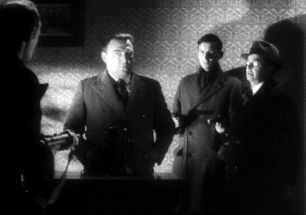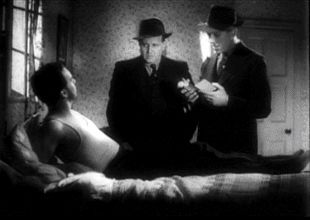At the peak of his career, Alfred Hitchcock, renown for his British and Hollywood-made suspense cinema, diverged from his usual formula to make two French language adventure movies designed as World War II propaganda films. Made in 1944, Aventure malgache (which translates as "Madagascan Adventure") and Bon Voyage remained virtually unseen until a 50th anniversary re-release and subsequent video distribution. These two short films may well be the most challenging films to assess in the entire Hitchcock filmography, for their overt goal of propaganda establishes a set of expectations alien to Hitchcock's suspense films, thus creating conflicts for the filmmaker and the critics alike.
By the mid-1940s, Hitchcock was on top of the movie world. With movies such as Rebecca and Foreign Correspondent, he had conquered Hollywood and become world renowned. When the British government, specifically the British Ministry of Information, decided to produce a pair of war propaganda dramas to help raise the spirits of people in Occupied France, Alfred Hitchcock was the first choice to direct the dramas. Having already edited a pair of English war documentaries (that were directed by others) in 1941, Hitchcock considered such work to be his patriotic duty, and he immediately accepted the offer from Sidney Bernstein of the Ministry's Film Division. Of course, a French director could have just as easily, if not more easily, directed these films. But the British Information Service aimed to control the project by placing a British director in charge, just as Prime Minister Winston Churchill was, at the time, exercising every imaginable strategy to control the exiled General Charles de Gaulle.
The plan called for British director Hitchcock to direct refugee French actors (and one or more actors from the U.K.) in two half-hour French language mini-movies designed to be shown in secret locations in Nazi-held France. The whole project was so secret that we still do not know for sure whether any screenings ever took place. Donald Spoto and most other filmographers say no, whereas Peter Noble is pretty much alone in asserting that the two films were seen in France in 1944 and 1945 (Sloan 198.) Bret Wood (58) believes that "Bon Voyage received limited exhibition in France," but that Aventure malgache was never screened.
The two films were certainly never widely distributed until half a century later, when the British government finally released them from its vaults. A 50-year wait indicates that the long disappearance of the films was due to more than disappointment on the part of a French distributor, as some maintain. It seems likely that the British government killed these films and wanted to keep them from ever reaching theater audiences. But finally, in 1993, Aventure malgache and Bon Voyage reached art house screens "as part of a touring Hitchcock series, made possible by the British Film Institute, under the sponsorship of Piper-Heidsieck Champagne" (Wood 54). Then, following video release in 1994, Aventure malgache and Bon Voyage were televised for the first time ever, in 1995, on the STARZ cable network.
Critical judgment, which consisted basically of reviewing the movies for their entertainment and cinematic value, was virtually unanimous, evaluating as mediocre Aventure malgache, and generally praising Bon Voyage as being as good as Hitchcock's better television half-hours. Some critics, such as Bret Wood, have asserted that Aventure malgache and Bon Voyage are "not just superficial propaganda" (Wood 58) but reasonably good films. However, relatively little assessment has been made of whether or not these two reasonably good films actually succeed as serviceable propaganda. (MORE about Propaganda.) Can a studio pick any highly commercial director, or any artistic director, or even an artistically commercial director such as Hitchcock, and get the desired propagandistic results? The Germans had already produced some extraordinary pro-Nazi documentaries thanks to the directing talents of former popular film actress Leni Riefenstahl, whose Triumph of the Will (Triumph des Willens, 1934) had made the Nazis look like saviors. Could the British find an antidote to this Nazi cinematic poison? And was that antidote Alfred Hitchcock? Could this director known as the "Master of Suspense," the "Master of Horror," and the "Master of Irony" serve as Master of Propaganda as well? Despite considerable obstacles inherent in working with a French cast, Hitchcock apparently breezed through the production process, largely thanks to "the fact that Hitchcock was bilingual" (Wood 55). Working satisfactorily within their "derisory budgets (Hitchcock was paid £10 a day)" (Kemp 57), Hitchcock, his art director Charles Gilbert, and his cinematographer Gunther Krampf kept things as simple as possible, achieving a dark, black-and-white "film noir" look on the cheap. In very brisk fashion, Hitchcock managed to shoot the two films during a four-week period from mid-January to mid-February of 1944. The stories that he chose to film have elements common to most Hitchcock works: suspenseful situations, exciting escapes, and romantic betrayals. In addition, the stories feature innocent people falsely accused but rising to the occasion by performing exceptional heroics. Hitchcock frequently reused these themes in his feature-length films, so he was likely attracted by their presence in the two French stories, which he helped to turn into screenplays. None of these themes appears innately antithetical to propaganda, so the projects must have seemed promising at the outset. Nevertheless, every director makes the choices of what to emphasize and what to play down in a given screenplay. Hitchcock, throughout his career, always chose to highlight irony, surprises, moral ambiguity, and the uncertainties of life. And that is precisely what he does in these French films. But is that an appropriate technique for the genre of propaganda? Propaganda, especially in a highly political wartime context, strives to glorify one system or ideology and assault the opposing views. In other words, propaganda needs to be clear, direct, and orthodox, with every perception razor sharp and every moral issue purely black and white. No ambiguity or alternative thinking is allowable. Accordingly, Hitchcock's view of the universe (as ironic, ambiguous, and uncertain) conflicts with the primary goal of successful propaganda. So, if Aventure malgache and Bon Voyage were to succeed, Hitchcock would have to resist the temptation to focus on the ironies and ambiguities. An analysis of these two films shows that Hitchcock, like Oscar Wilde, could resist anything except temptation. Hitchcock could not resist being himself, and running at cross purposes to the goal of propaganda that he ostensibly tried to embrace. 
|


